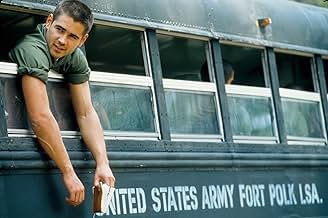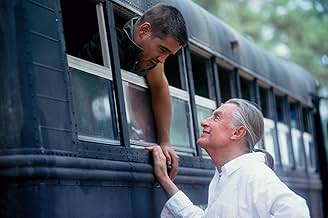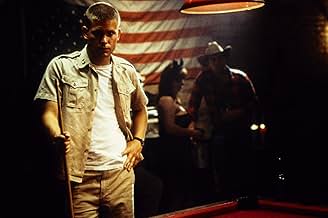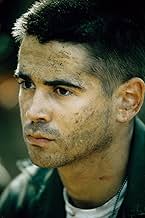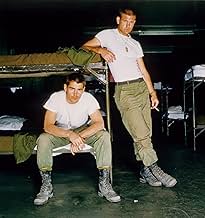AVALIAÇÃO DA IMDb
6,9/10
45 mil
SUA AVALIAÇÃO
Um grupo de recrutas passa pelo Treinamento Avançado de Infantaria em Fort Polk, o infame Tigerland da Louisiana, a última parada antes do Vietnã para dezenas de milhares de jovens em 1971.Um grupo de recrutas passa pelo Treinamento Avançado de Infantaria em Fort Polk, o infame Tigerland da Louisiana, a última parada antes do Vietnã para dezenas de milhares de jovens em 1971.Um grupo de recrutas passa pelo Treinamento Avançado de Infantaria em Fort Polk, o infame Tigerland da Louisiana, a última parada antes do Vietnã para dezenas de milhares de jovens em 1971.
- Direção
- Roteiristas
- Artistas
- Prêmios
- 2 vitórias e 5 indicações no total
Tom Guiry
- Pvt. Cantwell
- (as Thomas Guiry)
James MacDonald
- Staff Sgt. Thomas
- (as James McDonald)
- Direção
- Roteiristas
- Elenco e equipe completos
- Produção, bilheteria e muito mais no IMDbPro
Avaliações em destaque
I thoroughly enjoyed this movie, but it is nothing new.
Everyone here is grouping it with other war movies, this movie has been miscategorized! Its not a war movie any more than "One flew over the cuckoos nest" is a asylum movie or "Cool Hand Luke" is a prison movie. This is a movie about individuality, nonconformity, self-confidence and the costs of that personality type.
The plot is the same as "One flew over the Cuckoos nest" and "Cool Hand Luke", its in GOOD company, and it holds its own. Its these movies it should be held up against and compared, not "Apocalypse Now" or "Platoon".
Eric
Everyone here is grouping it with other war movies, this movie has been miscategorized! Its not a war movie any more than "One flew over the cuckoos nest" is a asylum movie or "Cool Hand Luke" is a prison movie. This is a movie about individuality, nonconformity, self-confidence and the costs of that personality type.
The plot is the same as "One flew over the Cuckoos nest" and "Cool Hand Luke", its in GOOD company, and it holds its own. Its these movies it should be held up against and compared, not "Apocalypse Now" or "Platoon".
Eric
American military authority is the enemy for Pvt. Roland Bozz (Colin Farrell), a nonconformist trainee who, along with other infantry trainees, endures brutal, sadistic treatment in preparation for combat in Vietnam. Tigerland is a swampy, steamy camp near Fort Polk, Louisiana that is supposed to simulate conditions in Vietnam. The story is set in 1971.
The amount and severity of physical and verbal aggression displayed in this film may be a tad overstated. But the point the film is making is that many, if not most, of the young guys drafted into the army in the late 60s and early 70s absolutely did not want, or deserve, to be there.
Roland Bozz is one of those young men. He's angry at the war, angry at the army. The army won't release him because they know that's what he wants. If Bozz can't get himself out, the next best thing is to try and get other recruits out. That will be his revenge, his way to fight the system.
A fellow trainee shares his background with Bozz, who then tells the trainee: "I know army regulations the way prisoners know the law. You're a hardship discharge, man, if ever I saw one. Okay. I'll get you out of the army". Bravo for Roland Bozz, a young rebel with a mission, a cause, trapped like the others by an oppressive, controlling institution.
Acting is very, very good. Colin Farrell is terrific, at a time when he, and the rest of the cast, was largely unknown. No need for overpaid A-list actors. The film's acting style trends naturalistic, spontaneous, and emotionally intense. None of the acting seems forced.
With a hand-held camera, combined with grainy film stock, and using quick zooms and unexpected cuts, the cinematography and editing convey a documentary look and feel, which results in sequences that are quite realistic. Lighting is mostly natural. Sets are plain and unadorned. Background music is minimal.
Much better than I ever expected, "Tigerland" is a well-made film with an intense, anti-war theme. It's about putting others ahead of one's own selfish interest. That Hollywood largely shunned this low-budget film is all the more reason to see it.
The amount and severity of physical and verbal aggression displayed in this film may be a tad overstated. But the point the film is making is that many, if not most, of the young guys drafted into the army in the late 60s and early 70s absolutely did not want, or deserve, to be there.
Roland Bozz is one of those young men. He's angry at the war, angry at the army. The army won't release him because they know that's what he wants. If Bozz can't get himself out, the next best thing is to try and get other recruits out. That will be his revenge, his way to fight the system.
A fellow trainee shares his background with Bozz, who then tells the trainee: "I know army regulations the way prisoners know the law. You're a hardship discharge, man, if ever I saw one. Okay. I'll get you out of the army". Bravo for Roland Bozz, a young rebel with a mission, a cause, trapped like the others by an oppressive, controlling institution.
Acting is very, very good. Colin Farrell is terrific, at a time when he, and the rest of the cast, was largely unknown. No need for overpaid A-list actors. The film's acting style trends naturalistic, spontaneous, and emotionally intense. None of the acting seems forced.
With a hand-held camera, combined with grainy film stock, and using quick zooms and unexpected cuts, the cinematography and editing convey a documentary look and feel, which results in sequences that are quite realistic. Lighting is mostly natural. Sets are plain and unadorned. Background music is minimal.
Much better than I ever expected, "Tigerland" is a well-made film with an intense, anti-war theme. It's about putting others ahead of one's own selfish interest. That Hollywood largely shunned this low-budget film is all the more reason to see it.
Tiger Land is a tough training camp for the US military. In 1971 it is the final step before the squads go to the war in Vietnam. In training before Tiger Land, one squad of young men is joined by troublemaker Roland Bozz, who continues his military trend of dissention and insubordination. However, his actions do not just affect him and he starts to change his ways slightly, but the stresses and the potential for death in Vietnam push all the men to breaking point.
Sold as a war movie, this film is more like the first half of Full Metal Jacket than a full on war movie set in a combat zone. As such it plays more like a drama than any sort of antiwar movie or outright thriller. The focus of the film is the character of Bozz as told from the biographical point of view of Paxton. The events of the film are pretty predictable for anyone who has seen this type of film before - the internal fights, the crazy soldiers, the domineering sergeant majors etc. However it still manages to be enjoyable and entertaining even if it never really feels original or new. It is a pretty nondescript film with no specific edge on it - and that is part of the reason I think it really didn't do that good business when it was released here in the UK. It relies very heavily on the characters to keep the audience involved in the story and preventing it being seen as just a collection of old ideas; this aspect is helped by the fact that it is drawing on original material, experiences and people.
A much bigger part of the characters being engaging is the playing of them by the cast. Farrell is the lead actor and is miles ahead of everyone else. This film is one of many that made him the star he now is, and he does deserve it off the back of this and he is really good here - coming across as likeable and difficult. Outside of him, everyone plays well but are generally in their various stereotypes; aside from Farrell, Collins is the standout role - too often seen playing gang bangers and such on TV cops shows, he delivers a solid character and presents a believable breakdown over the course of the film.
Keeping my habit of never paying to see an Schumacher film since Batman & Robin took the last faith in his talent, I waited for this to come onto TV. I was surprised however to see that Schumacher managed to do the film without spoiling it - in fact he came across as rather able! He uses mainly handheld cameras and delivers a gritty feel to the whole film that is fitting to the material. I hate to admit it, but he actually did a reasonable job here and he has now done a couple of films that he hasn't ruined in one way or another! I may have to change my mind about not paying for his films - well, maybe not.
Overall this is a rather undistinguished film but one that is enjoyable as a character driven drama, trading on the usual clichés of the genre. It goes where you more or less expect it to but it goes there and takes you with it. Farrell makes a good leading man and on this evidence he is worthy of leading man status where he has good support.
Sold as a war movie, this film is more like the first half of Full Metal Jacket than a full on war movie set in a combat zone. As such it plays more like a drama than any sort of antiwar movie or outright thriller. The focus of the film is the character of Bozz as told from the biographical point of view of Paxton. The events of the film are pretty predictable for anyone who has seen this type of film before - the internal fights, the crazy soldiers, the domineering sergeant majors etc. However it still manages to be enjoyable and entertaining even if it never really feels original or new. It is a pretty nondescript film with no specific edge on it - and that is part of the reason I think it really didn't do that good business when it was released here in the UK. It relies very heavily on the characters to keep the audience involved in the story and preventing it being seen as just a collection of old ideas; this aspect is helped by the fact that it is drawing on original material, experiences and people.
A much bigger part of the characters being engaging is the playing of them by the cast. Farrell is the lead actor and is miles ahead of everyone else. This film is one of many that made him the star he now is, and he does deserve it off the back of this and he is really good here - coming across as likeable and difficult. Outside of him, everyone plays well but are generally in their various stereotypes; aside from Farrell, Collins is the standout role - too often seen playing gang bangers and such on TV cops shows, he delivers a solid character and presents a believable breakdown over the course of the film.
Keeping my habit of never paying to see an Schumacher film since Batman & Robin took the last faith in his talent, I waited for this to come onto TV. I was surprised however to see that Schumacher managed to do the film without spoiling it - in fact he came across as rather able! He uses mainly handheld cameras and delivers a gritty feel to the whole film that is fitting to the material. I hate to admit it, but he actually did a reasonable job here and he has now done a couple of films that he hasn't ruined in one way or another! I may have to change my mind about not paying for his films - well, maybe not.
Overall this is a rather undistinguished film but one that is enjoyable as a character driven drama, trading on the usual clichés of the genre. It goes where you more or less expect it to but it goes there and takes you with it. Farrell makes a good leading man and on this evidence he is worthy of leading man status where he has good support.
TIGERLAND
Aspect ratio: 1.85:1
Sound format: Dolby Digital
Louisiana, 1971: During basic training, a rebellious army conscript (Colin Farrell) causes dissension within the ranks.
Given Joel Schumacher's reputation as a schlockmeister par excellence, most critics were caught off-guard by this low-budget drama, filmed without any of the frills and fripperies normally associated with Hollywood blockbusters, and headlined by little more than obscure (but hugely experienced) character actors and talented newcomers, including Farrell, whose bravura performance launched him to international stardom. Far removed from the extravagant Vietnam-operas favored by Francis Ford Coppola and Oliver Stone, Schumacher's film examines the contradictions of war and the dehumanizing effect of combat on ordinary men through the experiences of Farrell's anti-hero, a compassionate man who despises the self-serving patriotic nonsense peddled by his superiors, and who refuses to compromise his own ideals, despite the sometimes painful repercussions of his disobedience.
Though backed by a major studio, TIGERLAND has the look and feel of a low-budget indie production, using hand-held camera-work and grainy film-stock for documentary effect, and this uncompromising 'Dogme'-like approach allows Schumacher to focus his attention on the characters and their situation rather than the pyrotechnics which usually dominate such movies. Farrell may be the star of the show, but he's matched by debut actor Matthew Davis (BLOODRAYNE) as his closest friend and fellow combatant, an aspiring writer who volunteered for duty and who favors intellect and reason over Farrell's reckless bravado. Fine supporting cast, excellent technical credits.
Aspect ratio: 1.85:1
Sound format: Dolby Digital
Louisiana, 1971: During basic training, a rebellious army conscript (Colin Farrell) causes dissension within the ranks.
Given Joel Schumacher's reputation as a schlockmeister par excellence, most critics were caught off-guard by this low-budget drama, filmed without any of the frills and fripperies normally associated with Hollywood blockbusters, and headlined by little more than obscure (but hugely experienced) character actors and talented newcomers, including Farrell, whose bravura performance launched him to international stardom. Far removed from the extravagant Vietnam-operas favored by Francis Ford Coppola and Oliver Stone, Schumacher's film examines the contradictions of war and the dehumanizing effect of combat on ordinary men through the experiences of Farrell's anti-hero, a compassionate man who despises the self-serving patriotic nonsense peddled by his superiors, and who refuses to compromise his own ideals, despite the sometimes painful repercussions of his disobedience.
Though backed by a major studio, TIGERLAND has the look and feel of a low-budget indie production, using hand-held camera-work and grainy film-stock for documentary effect, and this uncompromising 'Dogme'-like approach allows Schumacher to focus his attention on the characters and their situation rather than the pyrotechnics which usually dominate such movies. Farrell may be the star of the show, but he's matched by debut actor Matthew Davis (BLOODRAYNE) as his closest friend and fellow combatant, an aspiring writer who volunteered for duty and who favors intellect and reason over Farrell's reckless bravado. Fine supporting cast, excellent technical credits.
TIGERLAND / (2000) ***1/2 (out of four)
By Blake French:
Throughout the years audiences have seen and understood war films with every point of view possible, and somehow producers and writers always come up with new and innovative methods of portraying various soldiers on the battlefield. Joel Schumacher ("8MM," "A Time to Kill"), easily one of the riskiest directors currently working, has found resemblance with "The Thin Red Line" in the way his new drama "Tigerland" steps in an individual soldier's shoes. This movie, written by Ross Klavan and Michael McGuther, has more guts and irony than "The Thin Red Line" or even "Saving Private Ryan." Although the movie's dramatic impact is somewhat lessened due to the perversity of the material present, it certainly enlightens us on a new perspective of young men training for war.
I would want to know Joel Schumacher's experiences with the army. Are the men really this unabashed and brutal? I am sure some of them are, but the movie views its uncompromising world through the eyes of a young man named Roland Bozz (Colin Farrell), who is rebellious against the ideas of war. His personality instantly counteracts with several other characters, one who becomes his best friend, Paxton (Matthew Davis), and another, Wilson (Russell Richardson), whose flamed temper often exasperates Bozz's tension with the idea of going to war. The war depicted in this production is not found on a battlefield, but on training grounds of a Louisiana-based instruction camp between conceptions and fears of the soldiers in training. This film is specifically about the preparation for war, nothing more nothing less. It ends when the soldiers finally go to war, kind of disappointing since witnessing the characters in action would have served as a supurb payoff.
Shot on location in about 28 days using 16mm stock and a minuscule budget, Joel Schumacher accurately displays a gritty, perverse, cruel, and unmerciful atmosphere using hand-held cinematography, unique lighting techniques and direct sound. Schumacher's grainy and blown-out images make the movie feel like a documentary feature. This unusual style of filmmaking only contributes to the hard core realism of the movie, quite graphic in its use of coarse language, perhaps a little too disturbing. Waves of four-letter words pound the audience, some in shock of what they are hearing. Even the extreme amount of vulgarism does not keep the dialogue from prevailing as heartbreaking, true, and emotional.
If anything, "Tigerland" provides us with a minor appreciation of how much our soldiers go through for our country in the beginning stages of combat. Such bravery must it take to enlist in the army during times of war, knowing the hardships and risks that are being taken. Such thought-provoking ideas are made possible through the heartbreaking performances by the young aspiring actors who portray the various trainees. This movie is not for all audiences, but one that young men should take a look at before enlisting themselves in the army...and adult audiences should watch to appreciate the courage needed to do such.
By Blake French:
Throughout the years audiences have seen and understood war films with every point of view possible, and somehow producers and writers always come up with new and innovative methods of portraying various soldiers on the battlefield. Joel Schumacher ("8MM," "A Time to Kill"), easily one of the riskiest directors currently working, has found resemblance with "The Thin Red Line" in the way his new drama "Tigerland" steps in an individual soldier's shoes. This movie, written by Ross Klavan and Michael McGuther, has more guts and irony than "The Thin Red Line" or even "Saving Private Ryan." Although the movie's dramatic impact is somewhat lessened due to the perversity of the material present, it certainly enlightens us on a new perspective of young men training for war.
I would want to know Joel Schumacher's experiences with the army. Are the men really this unabashed and brutal? I am sure some of them are, but the movie views its uncompromising world through the eyes of a young man named Roland Bozz (Colin Farrell), who is rebellious against the ideas of war. His personality instantly counteracts with several other characters, one who becomes his best friend, Paxton (Matthew Davis), and another, Wilson (Russell Richardson), whose flamed temper often exasperates Bozz's tension with the idea of going to war. The war depicted in this production is not found on a battlefield, but on training grounds of a Louisiana-based instruction camp between conceptions and fears of the soldiers in training. This film is specifically about the preparation for war, nothing more nothing less. It ends when the soldiers finally go to war, kind of disappointing since witnessing the characters in action would have served as a supurb payoff.
Shot on location in about 28 days using 16mm stock and a minuscule budget, Joel Schumacher accurately displays a gritty, perverse, cruel, and unmerciful atmosphere using hand-held cinematography, unique lighting techniques and direct sound. Schumacher's grainy and blown-out images make the movie feel like a documentary feature. This unusual style of filmmaking only contributes to the hard core realism of the movie, quite graphic in its use of coarse language, perhaps a little too disturbing. Waves of four-letter words pound the audience, some in shock of what they are hearing. Even the extreme amount of vulgarism does not keep the dialogue from prevailing as heartbreaking, true, and emotional.
If anything, "Tigerland" provides us with a minor appreciation of how much our soldiers go through for our country in the beginning stages of combat. Such bravery must it take to enlist in the army during times of war, knowing the hardships and risks that are being taken. Such thought-provoking ideas are made possible through the heartbreaking performances by the young aspiring actors who portray the various trainees. This movie is not for all audiences, but one that young men should take a look at before enlisting themselves in the army...and adult audiences should watch to appreciate the courage needed to do such.
Você sabia?
- CuriosidadesThe actors had no trailers, make-up artists, hairstylists, chairs or any of the typical luxuries.
- Erros de gravaçãoWhen Bozz brings the truck to a screeching halt with the can in the exhaust pipe, a modern clear plastic water bottle rolls across the truck floor.
- Trilhas sonorasSound Off
Written by Willie Lee Duckworth and Bernard Lentz
Principais escolhas
Faça login para avaliar e ver a lista de recomendações personalizadas
Detalhes
- Data de lançamento
- Países de origem
- Idioma
- Também conhecido como
- Camino de guerra
- Locações de filme
- Empresas de produção
- Consulte mais créditos da empresa na IMDbPro
Bilheteria
- Orçamento
- US$ 10.000.000 (estimativa)
- Faturamento bruto nos EUA e Canadá
- US$ 139.692
- Fim de semana de estreia nos EUA e Canadá
- US$ 26.715
- 8 de out. de 2000
- Faturamento bruto mundial
- US$ 148.701
- Tempo de duração1 hora 41 minutos
- Cor
- Mixagem de som
- Proporção
- 1.85 : 1
Contribua para esta página
Sugerir uma alteração ou adicionar conteúdo ausente

Principal brecha
By what name was Tigerland - A Caminho da Guerra (2000) officially released in India in English?
Responda



